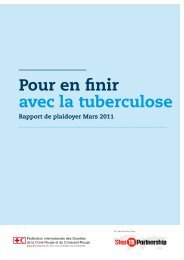Thailand - Stop TB Partnership
Thailand - Stop TB Partnership
Thailand - Stop TB Partnership
Create successful ePaper yourself
Turn your PDF publications into a flip-book with our unique Google optimized e-Paper software.
<strong>Partnership</strong>s<br />
Collaboration with private sector<br />
The NTP considers strengthening coordination among public and private <strong>TB</strong> service providers<br />
to be a priority. A donor-supported Public-Private Mix for DOTS (PPM DOTS) expansion<br />
program has achieved promising initial results, but NTP leadership and financial support<br />
will be necessary to ensure expansion of the program throughout the country. There are<br />
still too few opportunities for public and private practitioners to identify common goals and<br />
shared strategies for reaching them. Further study of pilot PPM DOTS projects could provide<br />
a basis for more effective and systematic integration of private practitioners as partners<br />
into the NTP’s DOTS expansion efforts.<br />
The NTP faces significant barriers in its attempts to promote public-private partnerships.<br />
Since private providers are not dependent on government funding, they have little<br />
incentive to comply with DOTS. Public facilities are sometimes reluctant to share knowledge,<br />
staff or equipment without the promise of receiving patient data in exchange. In turn,<br />
private providers are frustrated by the complicated and time-consuming case recording and<br />
reporting standards required by the NTP, especially since they see few if any benefits to<br />
their own clinics and institutions. The deputy director of one private hospital in Bangkok<br />
remarked that “people come to us for information and then they leave—they don’t tell us<br />
what to do or what they’re doing.” 140<br />
One pilot project has demonstrated that streamlining data collection systems made<br />
private providers both more willing to comply with DOTS and more willing to provide<br />
their patient data to the MoPH. When the MoPH, the U.S. Centers for Disease Control<br />
Collaboration (TUC), and Bangkok Metropolitan Authority (BMA) jointly launched a userfriendly,<br />
computerized case recording and reporting system, reporting from private hospitals<br />
improved significantly. For example, one BMA <strong>TB</strong> center identified up to 600–700 new<br />
<strong>TB</strong> cases, compared to 200 cases detected before the introduction of the computerized<br />
system. 141 According to the <strong>TB</strong> clinical staff, the computerized TUC forms are “relatively<br />
easy to complete.” 142 The BMA has also provided additional incentives to encourage private<br />
practitioners’ participation, including free x-ray and sputum testing services, training, and<br />
<strong>TB</strong> education materials. After a successful pilot phase, the project was expanded to seven<br />
BMA districts, and aims to reach all BMA districts eventually.<br />
University hospitals also play an important role in facilitating public-private<br />
partnerships and in delivering technical services. For example, the Faculty of Medicine at<br />
Mahidol University, in collaboration with a private hospital in Bangkok, established the<br />
62<br />
<strong>TB</strong> POLICY IN THAILAND



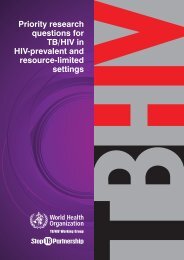
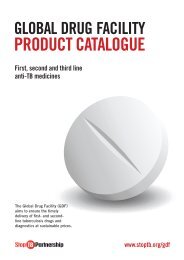
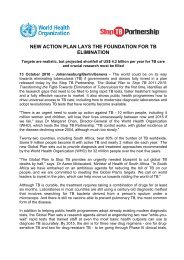
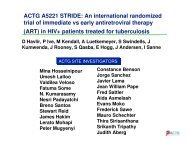
![Global Drug Facility Annual Report 2011 [.pdf] - Stop TB Partnership](https://img.yumpu.com/26788745/1/184x260/global-drug-facility-annual-report-2011-pdf-stop-tb-partnership.jpg?quality=85)

![Concept note on national stop TB partnership [.pdf]](https://img.yumpu.com/26788741/1/184x260/concept-note-on-national-stop-tb-partnership-pdf.jpg?quality=85)

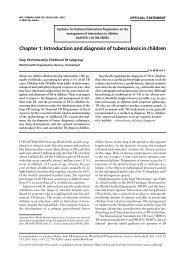
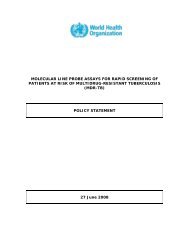
![2005 and Challenges for 2006 - 2015 [.pdf] - Stop TB Partnership](https://img.yumpu.com/26788674/1/190x245/2005-and-challenges-for-2006-2015-pdf-stop-tb-partnership.jpg?quality=85)
![Brochure (French) [.pdf] - Stop TB Partnership](https://img.yumpu.com/17234792/1/190x91/brochure-french-pdf-stop-tb-partnership.jpg?quality=85)

